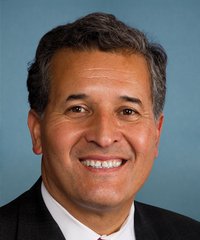
Congressman Juan Vargas was raised on a chicken ranch in National City, in California’s 51st District. He is one of ten children, born to his parents, Tomas and Celina Vargas on March 7, 1961. His father, Tomas, immigrated to the United States from Mexico in the late 1940s as part of the Bracero Program which brought millions of Mexican guest workers to the United States on short-term, primarily agricultural labor contracts, as part of a series of bi-lateral agreements between Mexico and the United States.
Through the Bracero Program, Tomas became a legal resident and Juan’s mother, Celina, went on to earn her U.S. Citizenship.
The climate crisis is here, and unless we take action at national and global level, it will only get worse. Underserved communities and people of color are disproportionately impacted by the effects of climate change. I support the Green New Deal to introduce green technology, cut carbon emissions, keep contaminants out of our water and soil, and address social inequities caused by climate change. I’m committed to working to protect our planet for the next generation.
I’m proud to represent many active duty servicemembers and veterans in our district. Since my election to Congress in 2012, I have supported legislation to protect those who protect our country. And I am a strong advocate for our deported veterans who risked their lives for our country and deserve a pathway to citizenship. All U.S. military veterans, regardless of immigration status, answered the call to serve our country. I will always honor their sacrifice.
Our district is home to several industries that I am proud to support. In Congress, I have worked with colleagues to pass legislation that creates good-paying jobs in our community and communities across the nation. I am a steadfast champion of ensuring equity is at the forefront of job creation in our district, particularly with the recently passed Bipartisan Infrastructure Law. Our workers deserve fair wages, safe work environments, and good benefits.
I am a supporter of the LGBTQIA+ community and believe no one should face discrimination based on sexual orientation or gender identity. We must ensure that anti-discrimination legislation protects LGBTQIA+ community members so they can buy homes, foster children, serve our country, get jobs, and more.
The following information is for businesses, especially small businesses. Please contact our office for assistance with any questions or problems you may have.
After a bill is introduced on the House or Senate floor, it is referred to the committee of jurisdiction (i.e., the committee charged with reviewing measures in the area of law or policy with which the bill is concerned). The committee of referral most often sends the measure to its specialized subcommittee(s) for study, hearings, revisions and approval.
For most bills, the committee or subcommittee fails to take further action on the referred bill, effectively "killing" the measure at this point. (Occasionally, a committee will report a measure "unfavorably," with explicit recommendations against its passage, or it will report a bill "without recommendation," which has the same effect as an unfavorable report.)
If the bill passes the subcommittee with a favorable vote, it is sent back to the full committee for further consideration, hearings, amendment and vote.
The U.S. Code is the official compilation of the current Federal statutes of a general and permanent nature. The Code is arranged according to subject matter under 50 subject headings ('titles'). The Code sets out the current status of the laws, incorporating all amendments into the text. Prior to being added to the U.S. Code, individual laws are published in pamphlet form as "slip laws" which are later collected together in chronological order (not in subject order) as the Statutes at Large.
The Congressional Record is the official transcript of the proceedings and debates of the U.S. Congress. A searchable version of the full text of the Congressional Record is published the day after each meeting of the House or Senate. Learn more about the Congressional Record. A summary of what is currently happening on the Floor of the House is available as the debate occurs. You can also view the current House Schedule.